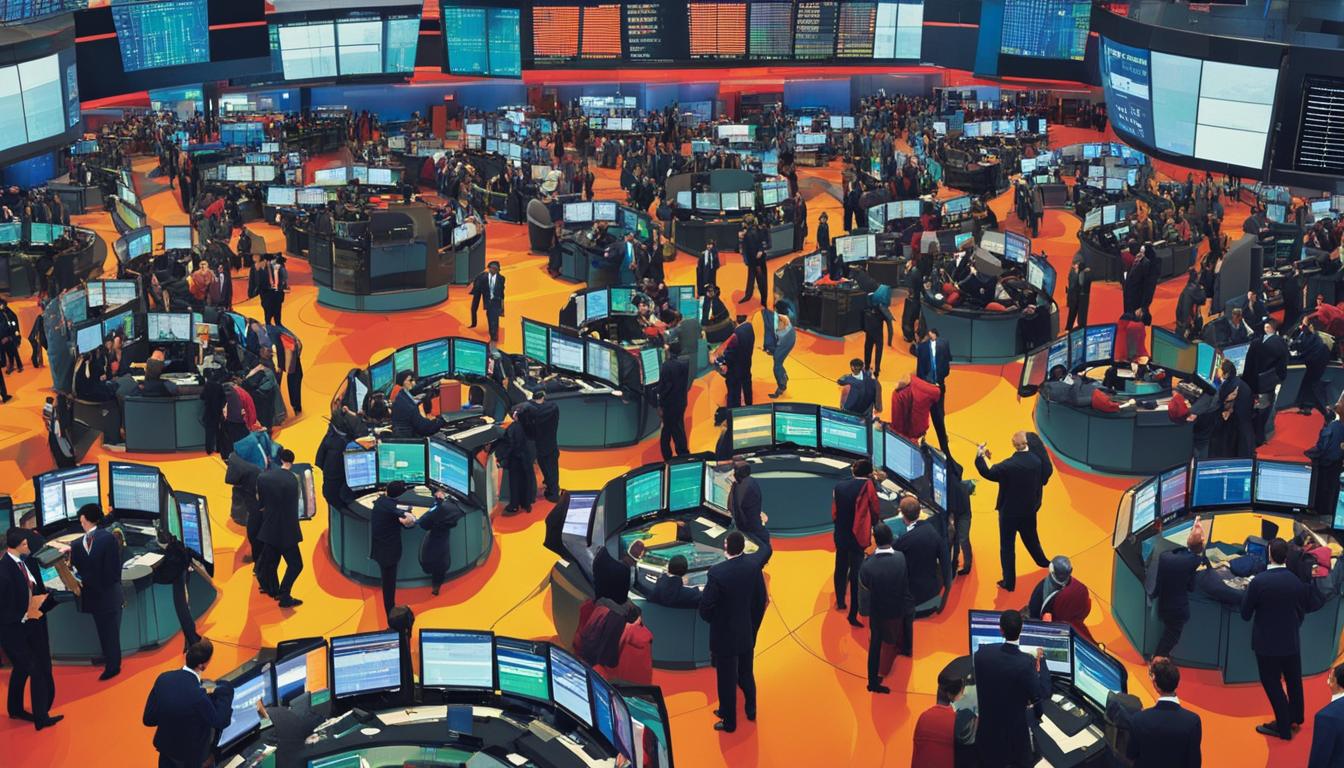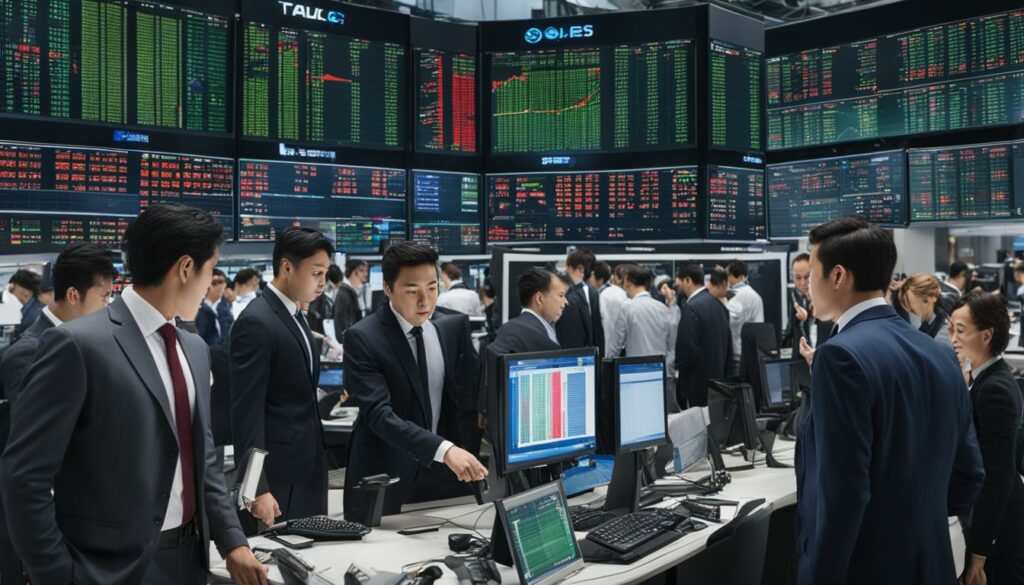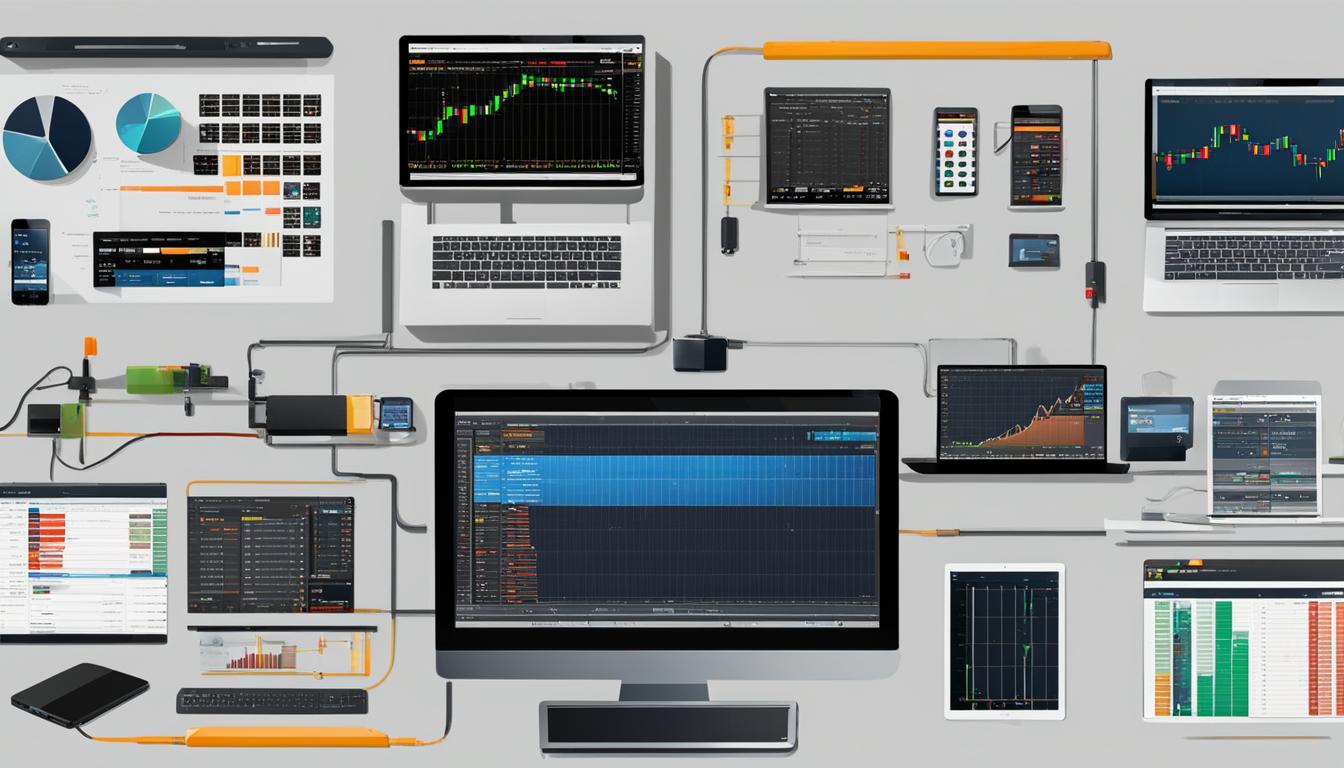Market Makers: Who They Are And What They Do

In the world of finance, market makers play a crucial role in ensuring the smooth functioning of the financial market. As liquidity providers, they create a market for securities, facilitating the buying and selling of assets for investors. But who exactly are these market makers, and what do they do? Let’s dive into the details.
Key Takeaways:
- Market makers are essential for maintaining liquidity in the financial market.
- They continuously price securities and execute trades at scale.
- Their role includes ensuring market stability and investor confidence.
- Market makers are highly regulated and work with regulatory bodies to uphold market integrity.
- Understanding the role of market makers is crucial for navigating the dynamic financial landscape.
The Role of Market Makers in Financial Markets
Market makers are essential for maintaining market liquidity and price stability. They provide continuous buy and sell quotes for securities, ensuring that there is always a market for investors to trade. The bid-ask spread reflects the profit market makers make on each trade. Market makers contribute to price formation by quoting prices based on market supply and demand. They also play a role in maintaining the order book, which records all buy and sell orders for a particular security. Understanding market microstructure is crucial for market makers to effectively execute trades and manage risk.
Market Microstructure and Price Formation
Market microstructure refers to the process and structure of trading in financial markets. It involves the analysis of market participants, trading mechanisms, order flow, and price dynamics. Market makers play a significant role in market microstructure as they provide liquidity and contribute to price discovery. By continuously quoting prices and actively participating in markets, market makers help facilitate efficient price formation. They take into account factors such as supply and demand, market trends, and other relevant information to determine the bid and ask prices for securities.
“Market makers contribute to price formation by quoting prices based on market supply and demand.”
The Order Book and Market Functioning
The order book is a crucial component of market functioning. It is a record of all buy and sell orders for a particular security, displaying the current bid and ask prices along with the corresponding quantities. Market makers help maintain the order book by providing competitive quotes and actively participating in trading. Their presence ensures that there is sufficient liquidity for smooth execution of trades and minimizes the impact of large orders on the market. Without market makers, the order book would be less vibrant, leading to wider bid-ask spreads and lower liquidity.
Market makers play a vital role in financial markets as liquidity providers. They ensure that there is enough liquidity for investors to buy and sell securities, maintaining market stability and efficiency. By actively participating in trading and providing continuous quotes, market makers contribute to price formation and help drive market dynamics. Understanding the role of market makers is crucial for investors and market participants alike as it enables them to navigate the financial market landscape effectively.

Market Makers vs. Brokers: Understanding the Difference
When it comes to the financial market, market makers and brokers are two important entities, each with a distinct role. Brokers act as intermediaries, facilitating the buying and selling of securities on behalf of investors. They provide valuable services such as investment advice and comprehensive research. Brokers offer a range of products and services, including retirement planning and portfolio management. They typically work for brokerage firms and earn commissions on the trades they execute.
On the other hand, market makers play a different role. They create a market for securities, ensuring there is enough liquidity for smooth trading. Market makers buy and sell securities to maintain market functioning and act as wholesalers. Large banks and financial institutions are often market makers. They provide continuous buy and sell quotes for securities, ensuring that there is always a market for investors to trade. Market makers earn their profit through the bid-ask spread, which is the difference between the buying and selling prices.
While both market makers and brokers operate in the financial market, their functions and operations are distinct. Brokers focus on executing trades on behalf of investors and providing comprehensive services, while market makers ensure market liquidity by creating a market for securities. Both entities play a crucial role in the financial ecosystem, contributing to the efficient operation of the stock exchange and facilitating investor participation.
How Market Makers Make Money
Market makers generate revenue through various means, with the bid-ask spread being a primary source of income. When market makers buy securities, they do so at the bid price, which is typically slightly lower than the prevailing market price. Conversely, when they sell securities, they do so at the ask price, slightly higher than the market price. The difference between these two prices is known as the bid-ask spread, and it represents the profit earned by market makers.
In addition to the bid-ask spread, market makers also earn commissions. As liquidity providers, they facilitate trades for their clients’ firms, earning fees or commissions for their services. By offering liquidity and enhancing market efficiency, market makers play a crucial role in the smooth execution of trades.
It’s important to note that market makers face various risks in their operations, including market risk, credit risk, and operational risk. To mitigate these risks, market makers employ sophisticated risk management strategies and technology, allowing them to provide continuous liquidity even in volatile market conditions.

Market makers generate revenue through the bid-ask spread and commissions by providing liquidity and facilitating trades. They play a crucial role in maintaining market efficiency and execution.
Market Makers and Market Structure
Market makers play a significant role in shaping market structure by ensuring there is sufficient liquidity for trading and facilitating efficient price discovery. With the use of advanced algorithmic trading strategies and trading platforms, market makers seamlessly provide liquidity to the market. This helps to maintain a robust and dynamic financial ecosystem.
Algorithmic trading is a crucial tool employed by market makers to execute trades with speed and precision. By leveraging complex mathematical models and historical data, market makers can make informed decisions on pricing and execution. This enables them to provide competitive bid and ask prices, contributing to the overall efficiency of financial markets.
Trading platforms are essential for market makers to manage their operations effectively. These platforms offer real-time market data, order management systems, and risk management tools. Market makers can monitor market activity, evaluate trading opportunities, and manage their inventory efficiently. This allows them to provide continuous liquidity and respond swiftly to changing market conditions.
Market makers are key participants in the options market, ensuring liquidity and managing volatility. Options market makers play a crucial role in pricing options and maintaining a market for buying and selling these derivative instruments.
Options Market Makers
In the options market, market makers serve as liquidity providers, ensuring there is a constant market for options contracts. They play a vital role in maintaining liquidity and managing volatility. Options market makers continuously quote bid and ask prices for various options contracts, facilitating trading and allowing investors to enter and exit positions efficiently.
Options market makers use sophisticated pricing models and real-time market data to determine bid and ask prices. They take into account factors such as the underlying asset’s price, volatility, time to expiration, and interest rates. This enables them to provide fair and competitive pricing for options contracts.
| Benefits of Options Market Makers | Challenges Faced by Options Market Makers |
|---|---|
|
|
Options market makers play a crucial role in enabling investors to hedge their positions, speculate on price movements, and manage risk. Their presence ensures that options markets are vibrant and accessible, providing valuable opportunities for market participants.

Market makers are integral to the overall functioning and structure of financial markets. They facilitate liquidity, contribute to efficient price discovery, and manage risk. Through the use of algorithmic trading strategies and trading platforms, market makers ensure smooth market operations and enhance investor confidence. In the options market, options market makers play a vital role in maintaining a liquid and robust market for options contracts.
Market Makers and Regulation
Regulation plays a crucial role in the market making business, ensuring market integrity, transparency, and investor protection. Market makers are subject to stringent regulations imposed by regulatory bodies such as the CBI, CFTC, FINRA, HK SFC, IIROC, OSC, SEC, and UK FCA. These regulatory agencies work closely with market makers to establish guidelines and standards that promote fair and efficient financial markets.
Market makers are required to register with regulatory authorities and adhere to strict compliance measures. They are obligated to maintain adequate capital reserves, implement risk management systems, and disclose their trading activities to regulatory bodies. This oversight ensures that market makers operate in a manner that upholds market integrity and safeguards investor interests.
By working collaboratively with regulators, market makers help shape market policies and practices. They provide valuable insights and expertise to regulatory discussions, contributing to the development of effective regulations that foster market stability and investor confidence.
Market makers strive to be a driving force for positive change in market structure globally. They actively participate in industry initiatives aimed at improving market transparency, enhancing liquidity provision, and promoting advancements in trading technology. By embracing regulatory mandates, market makers play a vital role in maintaining the integrity of financial markets and facilitating equitable access to financial opportunities for all market participants.

Regulation and Market Dynamics
The regulatory landscape for market makers continues to evolve as market dynamics change. Regulators regularly assess the impact of market structure changes on market makers and adjust regulations accordingly. This ongoing regulatory oversight ensures that market makers are well-positioned to adapt to emerging market trends while fulfilling their role as liquidity providers.
Market Integrity and Investor Protection
Regulation plays a pivotal role in preserving market integrity and ensuring investor protection. Regulatory guidelines impose strict standards on market makers to prevent market manipulation, insider trading, and other illegal activities. By adhering to these regulations, market makers help maintain a level playing field for all market participants, contributing to the overall fairness and credibility of financial markets.
| Regulatory Bodies | Country/Region |
|---|---|
| CBI | Ireland |
| CFTC | United States |
| FINRA | United States |
| HK SFC | Hong Kong |
| IIROC | Canada |
| OSC | Canada |
| SEC | United States |
| UK FCA | United Kingdom |
Conclusion
Market makers play a vital role in the financial market as liquidity providers, ensuring smooth trade execution and maintaining market stability. They contribute to market integrity by adhering to regulatory requirements and working closely with regulatory bodies. Market makers help shape market structure, facilitating price discovery and enhancing market efficiency.
By continuously providing buy and sell quotes for securities, market makers contribute to market liquidity, allowing investors to trade with confidence. Their role in maintaining the bid-ask spread helps generate revenue while ensuring fair pricing for market participants. Additionally, market makers employ sophisticated trading platforms and algorithmic strategies to provide seamless liquidity.
The highly regulated nature of market making underscores its importance in upholding market integrity. Market makers work diligently to comply with regulations and foster investor confidence. Their contribution to financial markets is crucial in creating opportunities and navigating the dynamic landscape.
FAQ
What is the role of market makers in financial markets?
Market makers provide liquidity by continuously buying and selling securities at competitive prices, ensuring there is always a market for investors to trade.
How do market makers make money?
Market makers earn a profit through the bid-ask spread, which is the difference between the buying and selling price of securities. They also earn commissions by providing liquidity to their clients’ firms.
What is the difference between market makers and brokers?
Brokers act as intermediaries, buying and selling securities on behalf of investors and providing investment advice. Market makers, on the other hand, create a market for securities, ensuring there is enough liquidity for smooth trading.
How do market makers contribute to market structure?
Market makers help shape market structure by providing liquidity, facilitating efficient price discovery, and managing volatility. They use sophisticated trading platforms and algorithms to ensure seamless execution.
How are market makers regulated?
Market makers are highly regulated and required to register with regulatory bodies such as the CBI, CFTC, FINRA, HK SFC, IIROC, OSC, SEC, and UK FCA. They work closely with regulators to uphold market integrity and investor protection.






